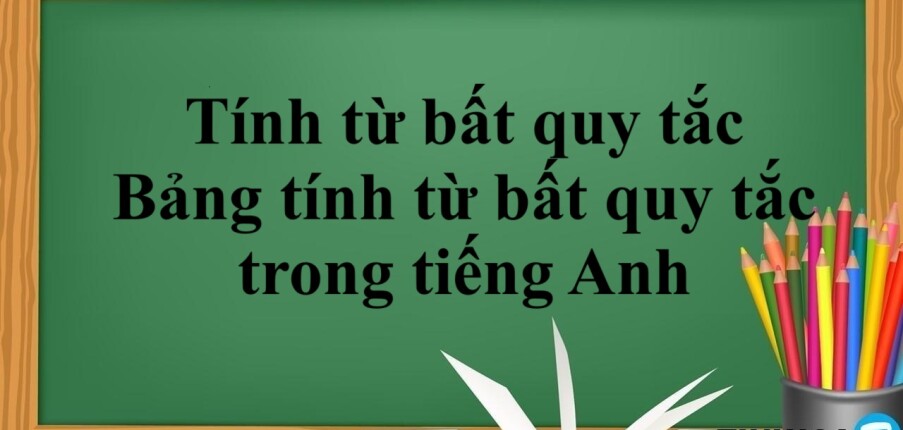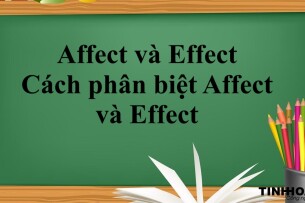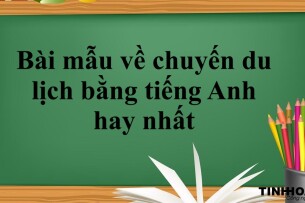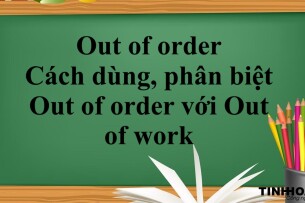Tính từ bất quy tắc là gì? | Cách dùng - Bảng tính từ bất quy tắc trong tiếng Anh và bài tập vận dụng
Tính từ bất quy tắc là gì?
Tính từ bất quy tắc (irregular adjectives) là loại từ không tuân theo quy tắc thêm hậu tố "-er" hoặc "-est" để tạo thành dạng so sánh hơn và so sánh nhất. Thay vào đó, các tính từ này có các dạng so sánh khác hoặc không thay đổi. Điều này làm cho việc học và sử dụng tính từ bất quy tắc trở nên khó khăn hơn so với tính từ có quy tắc. Ví dụ:
| Tính từ |
Tính từ so sánh hơn |
Tính từ so sánh hơn nhất |
Ví dụ |
| Good (Tốt) |
Better
(Tốt hơn)
|
Best
(Tốt nhất)
|
- She is a good singer. (Cô ấy là một ca sĩ giỏi.)
- I think the second option is better than the first. (Tôi nghĩ phương án thứ hai tốt hơn tùy chọn thứ nhất.)
- This is the best movie I have ever seen. (Đây là bộ phim hay nhất mà tôi từng xem.)
|
|
Bad
(Xấu)
|
Worse
(Xấu hơn)
|
Worst
(Xấu nhất)
|
- It was a bad idea to go out without an umbrella. (Đó là một ý tưởng tồi khi đi ra ngoài mà không có ô.)
- The situation is getting worse every day. (Tình hình đang trở nên tồi tệ hơn mỗi ngày.)
- That was the worst movie I have ever watched. (Đó là bộ phim tệ nhất mà tôi từng xem.)
|
|
Far
(Xa)
|
Further/farther (Xa hơn) |
Furthest/Farthest (Xa nhất) |
- The school is far from my house. (Trường cách xa nhà tôi.)
- If you walk further/farther down the road, you'll find the store. (Nếu bạn đi xa hơn trên con đường, bạn sẽ tìm thấy cửa hàng.)
- The park is the furthest/farthest from our house. (Công viên này xa nhất từ nhà của chúng tôi.)
|
Lưu ý: Như trong ví dụ trên về tính từ bất quy tắc: "good" (tốt) trên, khi so sánh ta không dùng "gooder" và "goodest", mà sử dụng dạng so sánh "better" và "best" thay thế.
Bảng tính từ bất quy tắc trong tiếng Anh
Dưới đây 1900 sẽ chia sẻ cho bạn bảng tính từ bất quy tắc, đặc biệt trong phần ngữ pháp so sánh hơn, so sánh nhất. Hãy cùng tìm hiểu ngay dưới đây nhé!
| Tính từ |
So sánh hơn |
So sánh nhất |
| Good (tốt) |
Better (tốt hơn) |
Best (tốt nhất) |
| Bad (xấu) |
Worse (Xấu hơn) |
Worst (Xấu nhất) |
| Many (nhiều - chỉ danh từ đếm được) |
More (nhiều hơn) |
Most (nhiều nhất) |
| Much (nhiều - chỉ danh từ không đếm được) |
More (nhiều hơn) |
Most (nhiều nhất) |
| Little (ít) |
Less (ít hơn) |
Least (ít nhất) |
| Old (cũ - chỉ người, vật) |
Older (cũ hơn) |
Oldest (cũ nhất) |
| Old (già - chỉ cấp bậc trong gia đình) |
Elder (già hơn) |
Eldest (già nhất) |
| Far (xa) |
Farther/Further (xa hơn) |
Farthest/Furthest (xa nhất) |
Cách dùng tính từ bất quy tắc trong tiếng Anh
Cách sử dụng tính từ bất quy tắc trong tiếng Anh thường khác so với tính từ có quy tắc, và đặc biệt tính từ bất quy tắc được sử dụng rất nhiều trong dạng so sánh hơn và so sánh nhất. Hãy cùng tìm hiểu tính từ bất quy tắc được sử dụng thế nào trong so sánh hơn và so sánh nhất nhé!
Tính từ bất quy tắc không thêm hậu tố "-er" hoặc "-est" để tạo thành dạng so sánh hơn và nhất. Thay vào đó, chúng có các dạng so sánh riêng. Ví dụ:
- good (tốt) ➞ better (tốt hơn) ➞best (tốt nhất)
- bad (xấu) ➞ worse (xấu hơn) ➞ worst (xấu nhất)
- far (xa) ➞ further/farther (xa hơn) ➞ furthest/farthest (xa nhất)
Bài tập tính từ bất quy tắc có đáp án
Exercise 1: Change verb into the past simple
1.I (read) _____ three books last week
2. They (speak) _______ French to the waitress.
3. He (understand) _______ during the class, but now he doesn't understand.
4. He (forget) ______ to buy some milk.
5. I (give) ______ my mother a CD for Christmas.
6. He (tell) _____ me that he lived in Toronto.
7. The film (begin) ______ late.
8. We (fly) ______ to Da Nang.
9. They (drive) _____ to Beijing.
10. He (teach) ______ English at the University.
Đáp án:
1. I (read) __read___ three books last week
2. They (speak) ___spoke____ French to the waitress.
3. He (understand) ___understood____ during the class, but now he doesn't understand.
4. He (forget) _forgot_____ to buy some milk.
5. I (give) ___gave___ my mother a CD for Christmas.
6. He (tell) __told___ me that he lived in Toronto.
7. The film (begin) _began_____ late.
8. We (fly) __flew____ to Da Nang.
9. They (drive) __drove___ to Beijing.
10. He (teach) ___taught___ English at the University.
Exercise 2: Change verbs into past participle
1. We've already (have) ____lunch.
2. This was the first time she had (do) _____ her homework.
3. He has never (drive) _______ a motorbike before.
4. By the time we arrived, the children had (eat) ______ all the chocolate.
5. Are you okay? I've (feel) ______ better.
6. I'd (lend) _____ my umbrella to John, so I got wet.
7. It had (become) ______ very cold, so we went inside.
8. Have you (choose) ______ your university yet?
9. Why has John (leave) _____ already?
10. She has (know) ______ about this problem for three months.
Đáp án:
1. We've already (have) _had___lunch.
2. This was the first time she had (do) __done___ her homework.
3. He has never (drive) __driven_____ a motorbike before.
4. By the time we arrived, the children had (eat) ___eaten___ all the chocolate.
5. Are you okay? I've (feel) __felt____ better.
6. I'd (lend) _lent____ my umbrella to John, so I got wet.
7. It had (become) __become____ very cold, so we went inside.
8. Have you (choose) ___chosen___ your university yet?
9. Why has John (leave) __left___ already?
10. She has (know) __known____ about this problem for three months.
Exercise 3: Change verbs into the correct form
1. Have you already (read) ______ today's newspaper?
2. He has (lose) _____ his wallet again.
3. They (speak) ______ French to the waitress.
4. They (swim) _____ 500m.
5. I have (write) _______ three essays this week.
6. She (drink) _____ too much coffee yesterday.
7. The children (sleep) ______ in the car.
8. I (send) ______ you an email earlier.
9. She had (wear) _____ her blue dress many times.
10. Why have you (stand) ______ up - are we leaving?
Đáp án:
1. Have you already (read) __read____ today's newspaper?
2. He has (lose) __lost____ his wallet again.
3. They (speak) __spoke____ French to the waitress.
4. They (swim) _swam____ 500m.
5. I have (write) __written_____ three essays this week.
6. She (drink) __drank___ too much coffee yesterday.
7. The children (sleep) ___slept___ in the car.
8. I (send) __sent____ you an email earlier.
9. She had (wear) _worn____ her blue dress many times.
10. Why have you (stand) ___stood___ up - are we leaving?
Exercise 4: Give the correct form of verb
1. Yesterday, I (go) ………. to the restaurant with a client.
2. We (drive) ……….around the parking lot for 20 minutes to find a parking space.
3. When he (arrive) ……….at the restaurant, the place (be) ……….full.
4. The waitress (ask) ……….us if we (have) ……….reservations.
5. I (say) ……….that he would come.
6. The waiter (tell) ……….us to come back in to hours.
7. My client and I slowly (walk) ……….back to the car.
8. We (stop) ………. at the grocery store and (buy) ……….some cakes.
9. My sister (get) ……….married last month.
10. Daisy (come) ……….to her grandparents’ house 3 days ago.
11. My computer (be) ……….broken yesterday.
12. He (buy) ……….me a big teddy bear on my birthday last week.
13. My friend (give) ……….me a bar of chocolate when I (be) ……….at school yesterday.
14. My children (not do) ……….their homework last night.
15. You (live) ……….here five years ago?
16. They (watch) ……….TV late at night yesterday.
17. (Be) ……….your friend at your house last weekend?
18. They (not be) ……….excited about the film last night.
19. Where (spend/you) ……….your last holiday?
20. I (visit) ……….lots of interesting places. I (be) ……….with two friends of mine.
Đáp án:
1. Yesterday, I (go) ……went…. to the restaurant with a client.
2. We (drive) …drove…….around the parking lot for 20 minutes to find a parking space.
3. When he (arrive) …arrived…….at the restaurant, the place (be) …was…….full.
4. The waitress (ask) ……asked….us if we (have) …had…….reservations.
5. I (say) …said…….that he would come.
6. The waiter (tell) …told…….us to come back in to hours.
7. My client and I slowly (walk) ……walked….back to the car.
8. We (stop) ……stopped…. at the grocery store and (buy) …bought…….some cakes.
9. My sister (get) …got…….married last month.
10. Daisy (come) …came…….to her grandparents’ house 3 days ago.
11. My computer (be) …was…….broken yesterday.
12. He (buy) …bought…….me a big teddy bear on my birthday last week.
13. My friend (give) …gave…….me a bar of chocolate when I (be) …was…….at school yesterday.
14. My children (not do) …didn’t go…….their homework last night.
15. You (live) ……Did you live….here five years ago?
16. They (watch) …watched…….TV late at night yesterday.
17. (Be) ……Was….your friend at your house last weekend?
18. They (not be) …weren’t…….excited about the film last night.
19. Where (spend/you) ……Where did you spend….your last holiday?
20. I (visit) …visited…….lots of interesting places. I (be) ……was….with two friends of mine.
Exercise 5: Read the sentences and fill in the blanks with the correct forms of the verbs
1. My parents _____________ home very late last Friday. (come)
2. My friends _____________ a wonderful present for my birthday. (give)
3. She _____________ very surprised when she _____________ that man there. (be/ see)
4. The boys _____________ ten minutes ago. (meet)
5. Somebody _____________ my money! (steal)
6. I _____________ my homework and then I _____________ all the books into my book. (do/ put)
7. Daisy _____________ (bring) some chocolates to the birthday party.
8. I _____________ (hear) a new song on the radio. I loved it! It _____________ (be) so cool.
9. Peter _____________ (understand) everything the teacher _____________ (say) in Maths.
10. My mother _____________ (forget) to buy some milk.
11. The children _____________ (sleep) in the car. They _____________ (be) so tired.
12. We _____________ (leave) at 7 a.m this morning before the kids _____________ (wake up).
Đáp án:
1. My parents _______came______ home very late last Friday. (come)
2. My friends _______gave______ a wonderful present for my birthday. (give)
3. She _____was________ very surprised when she ______saw_______ that man there. (be/ see)
4. The boys ______met_______ ten minutes ago. (meet)
5. Somebody ______stole_______ my money! (steal)
6. I _____did________ my homework and then I _____put________ all the books into my book. (do/ put)
7. Daisy _____brought________ (bring) some chocolates to the birthday party.
8. I _______heard______ (hear) a new song on the radio. I loved it! It _____was________ (be) so cool.
9. Peter ______understood_______ (understand) everything the teacher _____said________ (say) in Maths.
10. My mother ______forgot_______ (forget) to buy some milk.
11. The children _____slept________ (sleep) in the car. They ____were________ (be) so tired.
12. We _____left________ (leave) at 7 a.m this morning before the kids ___woke up__________ (wake up).
Exercise 6: Complete the text with the correct past simple form of the verbs in the brackets
1. Emma tried on a green dress and a blue dress in the clothes shop, and _____________ (choose) the blue one.
2. Our team _____________ (not win) the last match of the season.
3. We _____________ (go) bowling yesterday evening.
4. It was a long film, but I _____________ (not feel) bored.
5. The film _____________ (begin) at seven and finished at ten.
6. They _____________ (not spend) all their money on holiday.
7. Hannah _____________ (feel) relieved when she got her exam results.
8. My aunt _____________ (not be) at the family wedding last weekend.
9. We _____________ (get) home at eight o’clock on Sunday.
10. I enjoyed the film, but I _____________ (not / can) understand all of the dialogue.
Đáp án:
| 1 |
2 |
3 |
4 |
5 |
| chose |
didn’t win |
went |
didn’t feel |
began |
| 6 |
7 |
8 |
9 |
10 |
| didn’t spend |
felt |
wasn’t |
got |
couldn’t |
Exercise 7: Complete the sentences
1. We _____ (buy) a guidebook when we were in the museum.
2. That man _____ (get) on the train ten minutes ago.
3. We _____ (be) on the coach for six hours now.
4. How _____ (you/feel) when you were at the top of the mountain?
5. Mike _____ (live) in the US for three years..
6. She _____ (work) in Australia since 2015.
Đáp án:
1. We bought a guidebook when we were in the museum.
2. That man got on the train ten minutes ago.
3. We have been on the coach for six hours now.
4. How did you feel when you were at the top of the mountain?
5. Mike has lived in the US for three years.
6. She has worked in Australia since 2015.
Exercise 8: Fill in the blanks with the correct form of the verbs in brackets
1. Mary _____ (go) swimming after she _____ (come) home. After she _____ (swim), she _____ (call)
her friend Judy.
2. I _____ (go) to the theatre with my friends yesterday. I _____ (not/go) to the theatre for a year. We
_____ (have) a very good time.
3. After they _____ (finish) their breakfast, they (leave) for school.
4. Linda _____ (play) tennis after she (do) her homework.
5. My father _____ (water) the flowers after he _____ (clean) the car. After he _____ (have) dinner.
Đáp án:
1. Mary went swimming after she had come home. After she had swum, she called her friend Judy.
2. I went to the theatre with my friends yesterday. I hadn’t gone to the theatre for a year. We had a
very good time.
3. After they had finished their breakfast, they left for school.
4. Linda played tennis after she had done her homework.
5. My father watered the flowers after he had cleaned the car. After he had dinner.
Exercise 9: Complete the text with the past simple affirmative of the verbs in the box
|
be
|
not be
|
swim
|
have
|
call
|
|
decide
|
fall
|
hurt
|
invite
|
not stay
|
Yesterday it (1) _____ my friend ́s birthday. He (2) _____ a lot of friends from school. It (3) _____ very
hot so we (4) _____ to go to the swimming pool. There (5) _____ many people so we (6) _____ a lot.
Suddenly, Joe (7) _____ and (8) _____ himself. We (9) _____ an ambulance. He (10) _____ in hospital
but he (11) _____ a broken arm. That (12) _____ a memorable birthday!
Đáp án:
Yesterday it was my friend ́s birthday. He invited a lot of friends from school. It was very hot so we
decided to go to the swimming pool. There weren’t many people so we swam a lot. Suddenly, Joe fell
and hurt himself. We called an ambulance. He didn’t stay in hospital but he had a broken arm. That was
a memorable birthday!
Exercise 10: Make sentences from the prompts.
1. My mum/not study/Russian/at university.
=> ___________________________________ .
2. Last night/Marga and Alice/plan/their holiday.
=> ___________________________________ .
3. Tom/not invite/us/to his birthday party.
=> ___________________________________ .
4. the children/carry/the books/to the classroom?
=> ___________________________________ .
5. I/chat/to Jane/about the films and fashion.
=> ___________________________________ .
6. they/go/to the swimming pool/yesterday?
=> ___________________________________ .
Đáp án:
1. My mum didn’t study Russian at university.
2. Last night, Marga and Alice planned their holiday.
3. Tom didn’t invite us to his birthday party.
4. Did the children carry the books to the classroom?
5. I chatted to Jane about films and fashion.
6. Did they go to the swimming pool yesterday?
Xem thêm các tài liệu Tiếng Anh hay, chi tiết khác:
TOP Việc làm "HOT" dành cho sinh viên:




